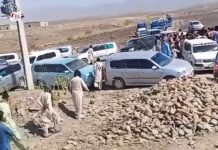Political parties within the ruling coalition have locked horns over the controversial Reko Diq bill as the Pakistani government desperately tries to come up with a solution to avoid paying $10 billion to the foreign mining company. The political situation in Pakistan is fragile as, for the first time, cracks have appeared in the Pakistan Democratic Movement (PDM), a coalition of political parties in power, when two key allies boycotted the federal cabinet meeting due to reservations over the revival of the Reko Diq mining project.
Pakistani Prime Minister, Shehbaz Sharif, presided over a meeting where two key allies – the Balochistan National Party – Mengal (BNP-M) and Jamiat Ulema-e-Islam (JUI–F) boycotted the meeting to register their protest. The two parties later joined to mark their presence.
The Pakistani Senate passed the Foreign Investment (Promotion and Protection) Bill, 2022, on Monday, giving the go-ahead for the reconstituted Reko Diq mining project. The bill, however, has received a lukewarm response at best and staunch opposition at worst; it has its critics not only in the opposition but the ranks of the ruling coalition as well.
Tense political situation
The political situation in Islamabad and Quetta has been tense over the past couple of weeks. Sensing the gravity of the situation, Shehbaz Sharif decided to hold a meeting of the federal cabinet to assure his allies that an amendment to the controversial bill would be soon tabled in the parliament. The two allies boycotted the meeting before the prime minister could make his point but later joined it.
BNP-Mengal and JUI-F opine that the Reko Diq bill, which would revive the mining project based in Chaghi – will rob the people of Balochistan of their rights. The two parties said they were not consulted and taken into confidence before the drafting and tabling of the bill.
The two parties met separately after the cabinet meeting where they mulled over the option to leave the alliance.
Information Minister Marriyum Aurangzeb said the cabinet had formed a committee to address the reservations of the allied parties and take them into confidence. “The cabinet committee will talk to leaders of the allied parties, take them into confidence and remove their reservations. An amendment bill will soon be tabled in the parliament after consultation”, she said in a post-cabinet meeting statement.
Ahead of Wednesday’s cabinet meeting, BNP-Mengal chief Akhtar Mengal met with Prime Minister Shehbaz Sharif in Islamabad. Mengal reportedly told the premier that by handing over the taxation, mining, and minerals rights to the centre, Qudduz Bizenjo [Balochistan Chief Minister] is left with nothing but his “dhoti.”
The Reko Diq timeline
The Reko Diq Mine is a planned mining project based in the Reko Diq town in Chaghi, Balochistan. It is one of the biggest reserves of gold and copper in the world, containing copper reserves of an estimated 5.9 billion tonnes and gold amounting to 41.5 ounces with 0.41% grading.
In 1993, Australian mining company BHP Bilton and the Balochistan government signed an agreement, known as the Chaghi Hills Exploration Joint Venture Agreement (CHEJVA), for the exploration and mining of gold and copper reserves at Reko Diq. As per CHEJVA, the company would develop the mine and own 75% of its holdings, and the Balochistan government would own the remaining 25% with an additional 2% royalty payment.
In 2000, the BHP handed over its obligations to another company, which was then acquired by the Tethyan Copper Company (TCC) in 2006. TCC is a consortium of two companies: the Chile-based Antofagasta and Canada-based Barrick Gold Corporation. The same year, the CHEJVA was challenged in the Balochistan High Court, which was struck down. In 2011, the TCC submitted a Mining Lease Application with the Balochistan government, which was rejected over disputes in some clauses of the agreement.
The TCC took the matter to the World Bank in 2011, demanding compensation of $11.43 billion in damages after the Balochistan government refused to allow them to mine in Reko Diq. The company argued it had already invested $220 million.
The Supreme Court of Pakistan doubled down on the Balochistan High Court decision and declared CHEJVA void on the grounds that the Balochistan government had transcended its legal limits by signing the agreement. In 2017, the World Bank tribunal decided that Pakistan had violated the agreement by unlawfully denying to extend the lease and that it was liable to pay damages. In 2019, the tribunal awarded $5.97 billion to TCC.
The Pakistani government negotiated and signed an out-of-court agreement with the TCC, giving them the right to develop the Reko Diq project. Antofagasta decided to withdraw from the project in exchange for $900 million paid by Pakistani shareholders. Under the reconstituted project, Barrick Gold would be a 50% partner with the Federal and Balochistan governments and three state-owned companies.
Center neglects allies and opposition
The incumbent government proposed the FI-Bill 2022 which was declared lawful and valid by the apex court of Pakistan. The Pakistani Senate passed the bill on Monday, paving the way for the revival of the mining project at Reko Diq. However, the bill has found its opponents both in Islamabad and Quetta.
On December 10, the Balochistan Assembly adopted two resolutions entrusting some taxation powers to the federal government in the Reko Diq project, much to the chagrin of the opposition parties. The opposition parties continue to protest against the resolution, arguing that by its adoption, the government has “sold” the Reko Diq project to Pakistan.
Chief Minister Balochistan Quddus Bizenjo says he had taken the opposition parties on board before moving ahead with the resolution, a claim denied by the opposition.
In a noisy session of the Balochistan Assembly on Wednesday, opposition MPAs lambasted the government for “passing resolutions in the dark of the night.” Mir Akbar Khan Mengal of the BNP-Mengal said that transferring the constitutional powers from Balochistan to the centre is a condemnable act. He said that the people of Balochistan don’t have the right and access to federal resources, they should at least have the right over their own resources.
JUI-F lawmakers also criticized the resolutions and said that their adoption deprived Balochistan of the powers handed over to it under the 18th amendment.
Due to the lack of quorum in the house, the assembly was adjourned till December 16.
Meanwhile, on Wednesday, a day after boycotting the federal cabinet meeting, BNP chief Akhtar Mengal decided to convene his party’s central executive committee meeting to take a final decision about quitting the coalition government. Mengal said the federal government had not taken his party into confidence on the bills passed in the Senate and National Assembly.
CM Balochistan’s arguement
After the clamorous session of the Assembly, the chief minister spoke to the media and said that his government worked very hard to revive the project. He said the project would benefit the people of Balochistan, and it should not be obstructed due to petty political issues.
He said that foreign investment is the panacea for Balochistan’s woes, and the Reko Diq project is a crucial step towards that end.
While the nationalist circles and the majority of Baloch citizens would disagree with Mr. Bizenjo. According to them, this is not the first time that the federal government makes promises of development and prosperity in return for Balochistan’s natural resources, but “Balochistan remains poor and underdeveloped as always.”
External support for opposition
Meanwhile, Muttahida Qaumi Movement (MQM) chief Altaf Hussain also sided with the opposition lawmakers. He said in a statement the Reko Diq bill is tantamount to breaking Pakistan, which is highly condemnable.
He said that the Senate passed a bill and handed over the rights to Reko Diq to the centre. It was better to abrogate Balochistan’s status as a ‘province’ and declare it a colony, the MQM chief said.
He said that by approving the FI-Bill 2022, the Supreme Court of Pakistan has rubbed salt in the wounds of the innocent Baloch, who have been robbed of their birthright. This is tyrannical, and I stand by the people of Balochistan through this ordeal, he said.
The ignored element in the drama
During this whole drama, the Former President of the Supreme Court Bar Association, Amanullah Kanrani pointed out the ignored, but not the least important element in Balochistan’s politics — the insurgency. Mr. Kanrani termed the Supreme Court’s decision on Reko Diq “very disappointing and worthy of concern”. He said in a media statement on December 10, that the wrong decision of Justice Munir of the Pakistan Supreme Court (SC) paved the way for the secession of East Pakistan [Bangladesh] in the past, and the current decision of the SC over Reko Diq would provide fuel to the ongoing “resistance movement” in Balochistan, which may have dire consequences in the future.
He said that the Supreme Court of the country has been playing a controversial role throughout history — adding that the decision of the court on the Reko Diq project is “biased and unfair”.
“On August 26, 2006, Nawab Akbar Bugti Shaheed was targeted inside the mountains of Taratani, and it was thought that peace had been established in the province, but the history of the last two decades shows us that we are far away from peace.” Mr. Kunrani warned that Balochistan is already amid the mayhem and not having any effective voice in the country can hide its problems but the spark will continue to burn, the flames of which can engulf the country.
It is worth mentioning that there is an ongoing independence movement in Balochistan for the last two decades. Which is the fifth and longest insurgency since 1948, the year of Balochistan’s “annexation” with Pakistan, which Baloch pro-independence groups term as the “illegal and forceful occupation” of their land.
Mr. Kanrani’s concerns are not far from reality, as the Baloch pro-independence armed groups’ one of most solid points is that the Pakistani state has been only looting and plundering their natural resources and keeping the rich Balochistan and its people poor and deprived of basic life facilities. And Balochistan depicts those claims as well. From education, roads, and medical facilities to jobs and infrastructure, the region portrays poverty and negligence by the authorities.
Whereas, the Baloch armed groups have been warning foreign investors and countries to not party with Pakistan in the “exploitative projects” in Balochistan. Those groups have also been nonstop carrying out massive attacks on CPEC and other projects for the last two decades across Balochistan.
Earlier in March, the Baloch Raji Ajoi Sangar (BRAS), the umbrella organization of multiple Baloch armed groups, specifically warned the Barrick Gold Corporation to “stay away” from the Reko Diq. “We totally reject the agreement of occupier Pakistan between the Barrick Gold Corporation, and we will go to extreme lengths to protect the Baloch land and its resources,” the group said in a press release.
At the Crossroads
The Reko Diq matter has brought Pakistan state to crossroads. If the mighty Federation and the Supreme Court revoke the decision and make history by paying attention to Balochistan’s issues, the country would bare the cost of at least $10 Billion. If otherwise, the ruling party might lose its two allies, as well as “fuel the independence movement”. The situation is also tricky for Balochistan’s political parties, especially for the prominent nationalist party in the parliament, the Balochistan National Party. If BNP’s demands are not met, it might let go of a strong ally and its strong position in the current government. But if the party compromises with the center, again it would lose its strong position among the people of Balochistan and also face massive criticism by radical and “pro-independence” groups.





























